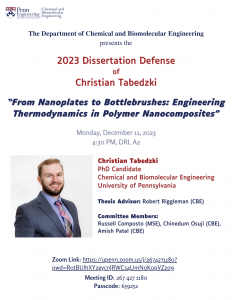
- This event has passed.
CBE Doctoral Dissertation: “From Nanoplates to Bottlebrushes: Engineering Thermodynamics in Polymer Nanocomposites” (Christian Tabedzki)
December 11, 2023 at 4:30 PM - 6:00 PM

Abstract: Polymer nanocomposites (PNCs) represent a diverse class of materials where manipulating design parameters is crucial for tailoring material properties. Of utmost importance for nanocomposites is nanoparticle dispersion, which is affected by the nanoparticle itself as well as the overall polymer melt, providing two design routes. This dissertation explores PNCs through two distinctive systems: (1) nanoplates grafted with polymers in a linear diblock copolymer matrix and (2) bare nanospheres in a core-shell bottlebrush matrix. The investigation advances the understanding of nanoparticle dispersion in linear diblock copolymer matrices and unveils the thermodynamics of a novel core-shell bottlebrush architecture. The initial focus on grafted nanoplates in linear diblock copolymers employs a hybrid particle/self-consistent field theory (hSCFT) to reveal the impact of nanoparticle insertion on polymer interfaces and exploring nanoparticle dispersion and inter-particle distance. The subsequent chapter extends this work, exploring diverse polymer matrix molecular weights and demonstrating the dependence of free energy minima on nanoplate size relative to lamellar domain dimensions. Shifting to a novel polymer architecture called core-shell bottlebrush copolymer, the analysis investigates the order-to-disorder transition, chain conformations, and thermodynamic integration of nanospheres. The research provides insights into the preference of nanoparticle localization within the bottlebrush structure, influenced by surface area considerations. Future work is proposed, including a comprehensive phase diagram exploration for core-shell bottlebrushes, expanded nanoparticle studies, and refinement of the liquid crystalline model to capture experimental complexities, emphasizing the need for continuous improvement in modeling PNCs to align with evolving experimental insights.

